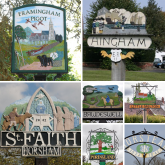CHANGES ARE ON THE WAY – SO BE PROACTIVE TO BENEFIT FROM THEM
Published 29 February 2020
 Details are starting to emerge about the future financial landscape once Brexit is complete and the Basic Payment Scheme disappears. And whilst we don’t have all of the details yet, it is really important that farming businesses start to make active preparations for the post-CAP world sooner rather than later.
Details are starting to emerge about the future financial landscape once Brexit is complete and the Basic Payment Scheme disappears. And whilst we don’t have all of the details yet, it is really important that farming businesses start to make active preparations for the post-CAP world sooner rather than later.
Despite the move to the back benches of Secretary of State for Agriculture Theresa Villers in last week’s cabinet reshuffle, the appointment of her erstwhile number two George Eustice as her successor means that the Agriculture Bill continues to progress towards enactment.
We already know that the Basic Payment Scheme will disappear by 2027. Countryside Stewardship will continue, and the new Environmental Land Management Scheme will be phased in from 2024 at the earliest.
At the CAAV CAP briefing last week in Birmingham, the strong key message from all the speakers – from organisations including DEFRA, RPA and CAAV - was this: in the post-BPS world, farm businesses will have to be sustainable without subsidy for the long term. Initiatives such as ELMS will not replace the income from BPS, but is likely to operate on an ‘income forgone’ basis – very different to what happens now.
The new regime will focus on a number of key areas for support, including environmental protection and improvement, public access and education, and the management of ‘key natural assets’, including soil and water, as well as the land’s ability to mitigate climate change.
All of this will require a key change of mindset: the focus will have to be on sustainable farming for the future. Food production will still have a key role to play, of course, but in this brave new world, a key priority for farmers will need to be taking responsibility for the condition of the land they manage, and guarding it for future generations.
As with any mindset change, this is going to take time. Some farmers think they can ride out the gradual decline in BPS and hang on for the introduction of ELMS from 2024. There are two reasons why this won’t work: firstly, ELMS is not a replacement for BPS income, as we have seen; and secondly, making the most of the changed funding landscape will require a significant structural change in the way many farming businesses operate.
The key, then, is not to put your head in the sand, but to start to prepare for the new reality now. Don’t wait until you see the first reductions on the 2021/2 BPS claim statement, but start planning for the future now.
Identify your natural capital assets, map your holding, and know its strengths and weaknesses. Understand what you already do, and start to consider what else you could do. That way it won’t be a question of surviving the changes, but benefitting from them.
Share this story
Arnolds Keys Blog

What do I need to consider about buying in a conservation area?
18 February 2020
The title ‘conservation area’ is the name given to an area of special architectural or historical interest, as determined by the local council. Read more >

THE AMBRIDGE FACTOR
12 February 2020
It’s not just the city which offers good buy-to-let potential – rural investors need to understand that tenants are looking for something beyond a nice property. Read more >

A RETURN TO NORMALITY?
7 February 2020
In our world of 280 character tweets, soundbites and ever-decreasing attention spans, the pithy phrase has gained a lot of traction. Read more >

Multi-Million Pound Deal Sealed
4 February 2020
Our Commercial Department are delighted to have sealed a multi-million pound retail property deal for a Beccles-based private property development and investment company – the second multi-million pound deal it... Read more >
